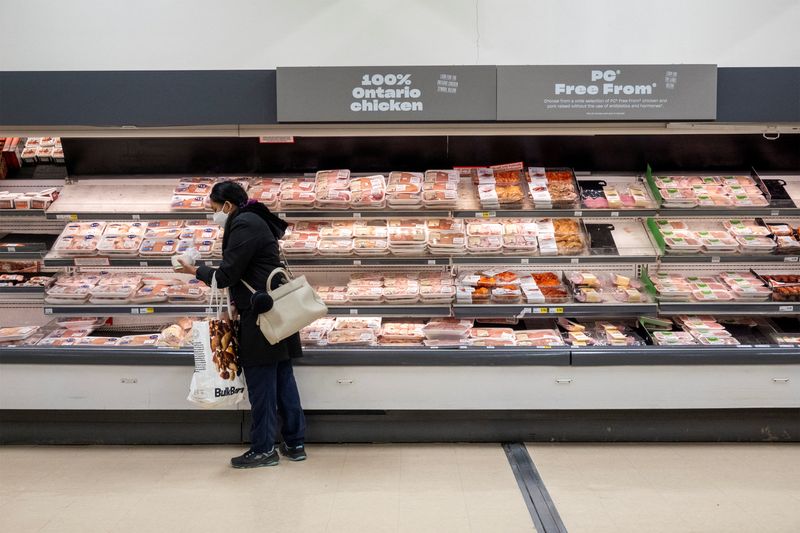By Promit Mukherjee and Steve Scherer
OTTAWA (Reuters) -Canada's annual inflation rate rose as expected in December, data showed on Tuesday, and underlying prices pressures remained, dashing hopes that the central bank would shift into rate-cut mode early this year.
Annual inflation rose to 3.4% in December from 3.1% in November, Statistics Canada said, matching estimates by economists polled by Reuters. On a monthly basis, consumer prices matched expectations as well and fell 0.3% from November.
Two of the Bank of Canada's (BoC's) core measures of underlying inflation, CPI-trim and CPI-median, accelerated, with the three-month annualized rate of the two rising to 3.6% from an upwardly revised 2.9% in the prior month, according to Royce Mendes, head of macro strategy for Desjardins Group.
"The stickiness in these core measures of inflation comes as a disappointment to Canadians hoping to see enough progress today to open the door to rate cuts," Mendes said.
Headline inflation has exceeded the BoC's 1-3% target range since March 2021.
The BoC raised its key policy rate to a 22-year high of 5% between March 2022 and July last year to tame inflation. The central bank's next interest rate announcement is on Jan. 24, when it is expected to keep its key policy rate on hold.
After the data, money markets saw a one-third chance that the BoC would start cutting interest rates in March, down from nearly 50% before the figures were released, but they still see a high chance of a 25-basis-point reduction in April.
"An awful lot has to go right even to get to the consensus call for cutting to begin by summer, let alone anything by March or April," said Derek Holt, vice president of capital markets economics at Scotiabank.
The annual inflation rate was largely driven by higher gasoline prices compared with the same period a year ago, Statscan said. Airfares, fuel oil, passenger vehicles and rent also accelerated. Food purchases from stores rose 4.7% on the year, the same as the previous month.
The acceleration of core inflation "speaks to the fact that the Bank of Canada still has some progress that they need to see in order to consider lowering interest rates," said Andrew Kelvin, chief Canada strategist at TD Securities.
"The BoC probably needs to be a little bit cautious before considering loosening monetary policy, just given that there are still some underlying inflationary impulses in the economy," Kelvin added.
Excluding energy and food prices, the annual inflation rate slowed to 3.4% from 3.5% in November.
The Canadian dollar clawed back some of its earlier decline but was still trading 0.3% lower at 1.3460 to the U.S. dollar, or 74.29 U.S. cents, as the greenback rallied against a basket of major currencies.
The BoC had previously forecast inflation should hit its target by the end of 2025, but Governor Tiff Macklem - making his last public appearance of 2023 - told reporters it should be closer to the target by the end of this year.
Canada's economy stalled in October. In the fourth quarter, Canadian companies said their order books declined as interest rates crimped consumer spending, and they see inflation easing, according to a BoC survey published on Monday.
